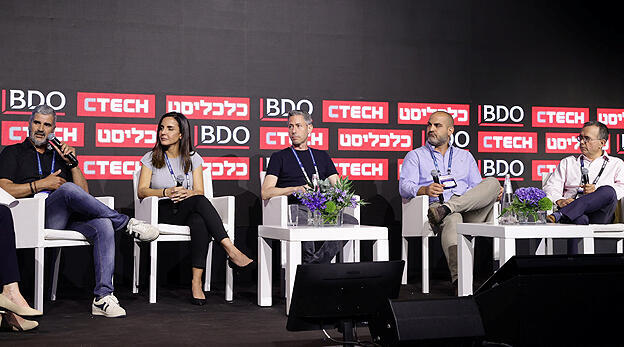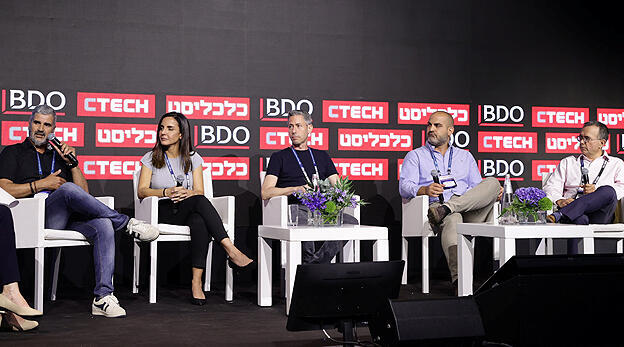
"The fintech startup space has gone back about 4-5 years this year"
Zvi Shif, Senior Partner, Head of Financial Cluster at BDO Israel, was speaking during a panel discussion at the Financial Innovation conference
"The fintech startup space has gone back about 4-5 years this year," stated Zvi Shif, Senior Partner, Head of Financial Cluster at BDO Israel, during a panel discussion at the Financial Innovation conference hosted by Calcalist. The panel, moderated by Irit Avisar, included Avivit Bender, Chief Corporate Development & Fintech Officer at Bank Hapoalim; Or Liban, Head of Israel & the Middle East at Airwallex; Moshe Kimhi, CEO and founder of Neema; and Arik Chicotay, COO and CBO at bank One Zero.
"In 2021, there was a significant boom," Shif commented. "However, in 2022, the war in Ukraine and rising inflation had an impact. We are witnessing challenges in the companies we visit, and many startups are struggling to recruit talent. Today, startups can only attract employees if they possess unique technology and exceptional individuals. This necessitates significant cost-cutting measures. Work that was previously done in Israel is now outsourced to India and other more affordable countries. Some companies are even forced to shut down operations."
1 View gallery


Financial management panel during the Financial Innovation conference.
(Photo: Orel Cohen)
What are your thoughts regarding the decline of Silicon Valley Bank?
"This signifies a shift from pursuing growth at any cost," said Liban. "We are now focused on optimizing operations and becoming more efficient. At the same time, we explore opportunities for optimization that benefit our customers. Those who act swiftly will be able to monetize their customers more effectively and gain a competitive advantage."
Avivit, do you notice more fintech companies seeking collaboration with your institution?
"First and foremost, we are observing a decline in the number of fintech companies," testified Bender. "Similar to other venture industries, fintech is facing a challenging reality. Startups must balance cash burn rates to sustain accelerated growth. I believe that resilient entrepreneurial teams will emerge stronger from this period. Many fintechs previously overlooked the local market but are now seeking collaborations with us."
Moshe, fintech companies usually target young or affluent individuals. Why did Neema focus on a less desirable audience - foreign workers?
"We ventured into a segment that experiences significant pain," explained Kimhi. "Where there is failure, there is an opportunity to create value. Our journey began by developing a digital application that offers an alternative to traditional banking services, specifically facilitating money transfers from Israel to other parts of the world. The application primarily served foreign workers, addressing their most pressing pain point. We cater to approximately half of the foreign workers in Israel, including individuals from China, Japan, the Philippines, and more. The need to transfer money out of Israel remains a considerable challenge even today. With our platform, users can transfer funds not only to banks but also to wallets. We provide speed, competitive pricing, and a range of services suitable for anyone in need of managing accounts domestically and abroad."
Arik, at One Zero, you operate as both a bank and a fintech company. Why did you choose this model, and do you collaborate with other fintech companies?
"We are a hybrid entity," confirmed Chicotay. "We engage in collaborations with fintech companies, but our primary focus is always the customer. We prioritize delivering the highest value to our customers. For instance, when it comes to insights, we recognized that developing our software in-house would be most effective. We aimed not only to provide clients with a database but also to offer them solutions and insights. We understood that internal development would deliver the best value to our clients."
Or, Airwallex announced its entry into Israel last May. Could you tell us more about the company?
"We are a fintech company that offers payment systems and business accounts to businesses," explained Liban. "Established in 2015 in Australia, our company is valued at $5.6 billion. When we consider the European and Middle Eastern regions, Israel becomes a significant focal point. We seek to collaborate with Israel due to its technological expertise, which aligns well with our company's objectives. Additionally, we have a global perspective and explore opportunities worldwide, including in Turkey and sub-Saharan Africa."
Are there opportunities here for startups looking to be acquired by your company?
"There is a demand for such acquisitions, but that wasn't the sole motivation for our presence here," clarified Liban. "We believe in the ecosystem and the ability of Israeli startups to thrive globally. Exceptional startups in Israel will not only survive but continue to grow."













